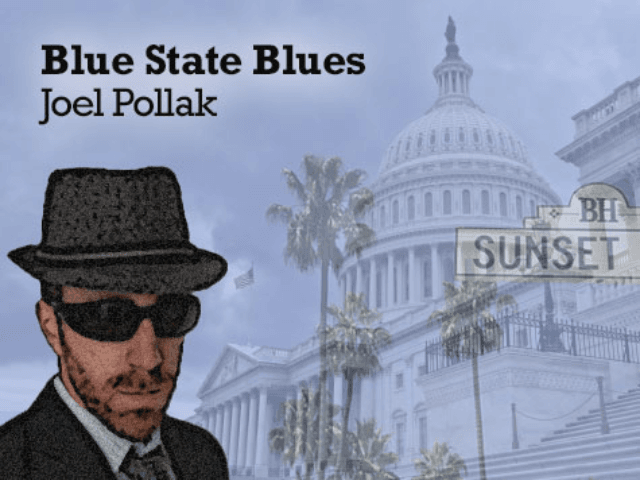One of the more interesting lessons Democrats may learn in their newfound enthusiasm for George Orwell’s Nineteen Eighty-Four — which is a critique of socialism, but never mind — is the way that totalitarian societies destroy intimate relationships.
In the dystopian future envisioned by Orwell, children betray their parents to the Thought Police, and sex is discouraged because it creates relationships outside the state. A secret love is the most revolutionary act — and, ultimately, a futile one.
Today, in the United States, we are witnesses to — and participants in — the destruction of friendships and relationships over political disputes that rage uncontrollably on social media, carry over into the workplace, and even continue into the home.
A few weeks ago, a Reuters/Ipsos poll revealed that 39% of Americans had argued about politics with friends and family, and one-sixth had “stopped talking to a family member or friend because of the election.” True, 40% of respondents said they had not had those kinds of arguments, but that may also be because Americans are increasingly withdrawing into political camps.
It is fashionable, especially in Washington, to blame these divisions on an increasingly partisan media. And that is partly true.
Orwell observed — separately, in 1944 — that modern innovations in communication and travel had inspired new ways to divide people, rather than bringing the world together. Of radio, for example, he observed: “It is nonsense to say that the radio puts people in touch with foreign countries … each national radio is a sort of totalitarian world of its own, braying propaganda night and day to people who can listen to nothing else.”
The same is true of social media and domestic politics today. Theoretically, Facebook and Twitter ought to make it easier for us to communicate with, and understand, people with different views. In practice, they encourage us to huddle with like-minded people and sever relations with the other side.
Twitter is the most brutal of social media platforms, because it allows people to bash each other from behind pseudonyms and avatars. But Facebook is even more damaging, because it takes pre-existing associations — families, schools, towns — and exposes them to the ravages of intense political debate.
On Twitter, we form alliances with strangers who agree with us; on Facebook, we discover the opposing political views of people with whom we may have shared close lifelong connections.
Social media platforms are increasingly important sources of news. And so the new political divisions in the world of journalism are filtering into our social media, which in turn exacerbates those media divisions in a seemingly endless feedback loop. But the media are not solely responsible.
The deliberate politicization of intimacy began with a specific campaign — namely, President Barack Obama’s 2008 run, which used social media technology to drive a political message.
Obama told his supporters explicitly to approach their neighbors and “argue with them, and get in their face.” His surrogates took that approach even further. Hollywood celebrity Sarah Silverman encouraged Obama’s Jewish supporters to travel to Florida and tell their ostensibly racist grandparents to vote for him. Later, once Obama was in office, the supposedly non-partisan Rock the Vote organization told young people to withhold sex from partners who refused to support Obamacare.
The politicization of intimacy has been a Democratic campaign strategy ever since. And after the 2016 election, it has only continued.
Anecdotally, conservative acquantances report that their (understandably) frustrated and (irrationally) fearful liberal Facebook friends have tried to hold them personally responsible for every perceived misstep by President Donald Trump. As much as conservatives disliked Barack Obama and his policies, that kind of behavior seemed far less common.
Just recently, a friend posted on Facebook: “I got blocked by a liberal tonight. My brother.”
This quiet dissolution of American social life should worry us, for the simple reason that the intimate connections among neighbors, family, and friends are the glue that holds our otherwise individualistic society together.
Alexis de Tocqueville noted in Democracy in America, nearly 200 years ago, that our system functions because of the overlapping associations we form with one another. Those are at risk.
Fifteen years ago, Americans were deeply divided over the results of the 2000 presidential election and the Florida recount. It took the horrific events of September 11th, 2001 to bring the nation together. One hopes it does not take a similar event this time.
This week, in addressing Congress, President Trump united the nation in applauding and comforting the widow of a fallen Navy SEAL.
It was a rare moment of unity, a reminder that we can — and must — renew what we still hold in common.
Joel B. Pollak is Senior Editor-at-Large at Breitbart News. He was named one of the “most influential” people in news media in 2016. His new book, How Trump Won: The Inside Story of a Revolution, is available from Regnery. Follow him on Twitter at @joelpollak.

COMMENTS
Please let us know if you're having issues with commenting.